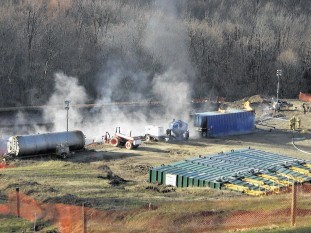
Fracking poses no danger to underground water supplies, new research findings from Glasgow University suggest.
One of the concerns of people opposed to the development of shale gas by hydraulic fracturing is that it could cause fluids to contaminate underground freshwater resources known as aquifers.
However, in a new paper just published online in the journal Earth and Environmental Science Transactions of the Royal Society of Edinburgh, Professor Paul Younger from Glasgow University’s school of engineering insists fracking on a large scale poses no such danger.
He based his evidence on a detailed study of the Selby coalfield in Yorkshire.
Prof Younger said: “In order for aquifers to be contaminated, an interconnection between a fracture and an aquifer would need to be created during the fracturing process.
“Firstly, shale gas developers have a major vested interest in preventing this from happening, since it would result in a great deal of expense to pump it away before gas production could begin. Secondly, we can see from Selby, which is located at less than half the depth of proposed shale gas fracturing zones, that total isolation from aquifers is entirely likely.”
He added: “There may be other reasons for opposing the use of indigenous gas resources, but aquifer pollution due to fracking at great depths is not one of them.”
The work was partly funded by the Natural Environmental Research Council and the Engineering and Physical Sciences Research Council.